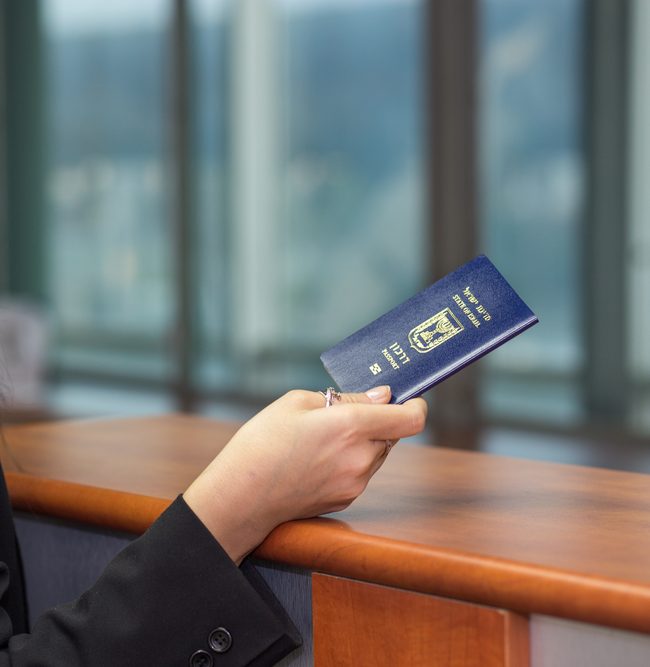Second citizenship: advantages and disadvantages
Israeli citizenship: the pros
Anyone considering getting Israeli citizenship knows that before gathering the necessary documents, it is essential to think carefully about the pros and cons.
As always, we have prepared a list of the pros and cons in advance, so you can assess the advantages and disadvantages of an Israeli passport and make an informed decision on your own. Spoiler alert: There are numerous advantages, and they often outweigh the disadvantages.
an Israeli citizenship specialist
Living standards

Trips
The biggest advantage of Israeli citizenship is the visa-free access to 161 countries. The list includes all European countries, the UK, Canada, and Japan. Although a US visa is required, we have good news: Israelis are granted a 10-year visa to the US right away.
Healthcare.
Everyone knows about the top-notch local healthcare system. Getting Israeli citizenship will grant access to the finest medical resorts and hospitals worldwide. According to statistics, Israel ranks among the top 20 countries with the highest number of centenarians, contributing to an average retirement age of 83 years.
Education
When relocating with your family, it is essential to plan ahead for education, and in Israel, you will find some of the best options. Diplomas from Israeli schools and universities are highly valued globally, so you can rest assured about your future prospects.
Sea, sun, and beaches
A favorable climate is another excellent advantage of obtaining citizenship. At the very least, you’ll have a prestigious vacation spot by the sea – and Israel has three of them: the Red Sea, the Mediterranean, and the Dead Sea. At best, you will enjoy a warm climate with no snowstorms in winter, and in January, the average temperature ranges from +5 to +20C, depending on the region.
Warm Welcome
You can feel the warmth and loyalty of the Israelis right from the start. Repatriates who decide to live in the country receive payments, $850 per person per month for the first six months.
Israeli Citizenship: Cons
Every good thing comes with a downside, and it is no exception for Israeli citizenship.Future citizens should be well-informed about the disadvantages before taking the step.
The Army
The first concern for repatriates might be the mandatory military service. In Israel, all citizens, regardless of gender, are required to undergo military service. When young boys and girls turn 18, they are conscripted for this duty. Non-residents do not serve in the army but must inform the authorities once a year that they are not residing in the country. Additionally, if they return after the age of 22, military service becomes voluntary and not compulsory.
The draft age goes up to 28 years, but there are special conditions for new repatriates. Citizens who returned to Israel after the age of 22 are not obligated for military service, but they can choose to serve voluntarily. Pregnant and married individuals, including women and men with children, are fully exempt from service. Married men have their service duration reduced to 18 months.
Martial Law
Furthermore, the country’s unstable military situation can be a deterrent for those considering Israeli citizenship. Israel and Palestine have been struggling to find a peaceful resolution and have been dividing territory for many years. This insecurity is evident even in apartment layouts, where each house has a mamak – a special room designed to provide protection from external attacks. In apartment buildings, there are mamads, which are rooms meant to serve several families simultaneously for the same purpose.
However, there is really no need to be afraid. Open military conflicts are infrequent. The state invests significant resources in its security system and attracts millions of investments from abroad. As a result, Israel maintains a high global security index, ranking alongside European countries like Norway, Luxembourg, Spain, and Portugal.
Cost of Living
The high utility bills and overall expensive living costs might deter some people. However, as we mentioned earlier, there are high salaries and social benefits for new citizens, which help compensate this downside. On the other hand, Shabbat might be an unfamiliar and potentially negative experience for repatriates.
Shabbat

The last minor drawbacks include the restriction on Israelis entering certain countries and the time-consuming process of collecting and executing documents for receiving Darkon (Israeli ID card). However, these concerns can be easily addressed because:
- The list of countries banning entry for Jews includes places like Iran, Iraq, Syria, Libya, and others. Considering this, it’s best to avoid unnecessary visits to these countries. However, if you still have an interest, you can use your existing passport for such travels.
- Paperwork in Israel can be challenging for new repatriates due to its specific requirements, typically taking 3-4 months. But with WRAI specialists’ full support in Israel, the procedure can be completed in just 2 to 10 days, depending on the chosen service level.
an Israeli citizenship specialist
